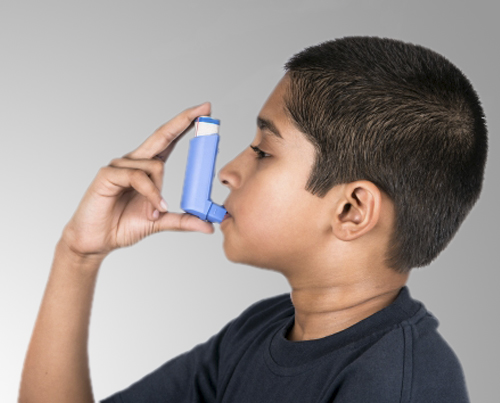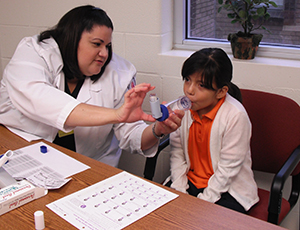Taking control of childhood asthma in South Texas

 Throughout the past two decades asthma cases have steadily increased as a major pediatric health concern across the United States and in Texas. According to the American Lung Association and the Centers for Disease Control and Prevention, asthma is one of the most common chronic disorders for children today.
Throughout the past two decades asthma cases have steadily increased as a major pediatric health concern across the United States and in Texas. According to the American Lung Association and the Centers for Disease Control and Prevention, asthma is one of the most common chronic disorders for children today.
The Rio Grande Valley of South Texas has some of the highest asthma related hospitalization rates for children in the state. This is in large part due to high levels of pollen in the air, high usage of agriculture pesticides, and a high poverty rate.
“Many people are not aware that the majority of asthma triggers may be found in and around their homes,” said Genny Carrillo Zuniga, M.D., Sc.D., M.S.P.H., M.P.H., associate professor at the McAllen Campus of the Texas A&M Health Science Center School of Rural Public Health.
Common asthma triggers, according to Carrillo Zuniga, include mold, dust mites, pet dander, rodent and insect droppings, excessive moisture, cleaning products, pesticides and cigarette smoke.
In 2008, Carrillo Zuniga formed the McAllen Asthma Coalition (MAC) with support funding from the U.S. Environmental Protection Agency (EPA) and Texas Department of State Health Services. MAC brings together students and educators from local colleges, with representatives from the American Lung Association and other government organizations, to develop an educational curriculum on how to properly identify asthma triggers and manage asthma symptoms.

Carrillo Zuniga has spent the past five years developing culturally appropriate self-management training programs for asthma suffers and their families in order to decrease the number of asthma related hospitalizations, emergency room visits, and missed school days for children. At the McAllen Campus, she trains respiratory therapy students from South Texas College (STC) and nursing students from the University of Texas-Pan American (UTPA), who in turn educate elementary
and middle school children and school nursing staff on asthma management and control.
“It has been rewarding to initiate this collaborative with local higher education institutions to address asthma as a public health improvement project,” said Carrillo Zuniga.
Her goal has been to provide families, health professionals and school nursing staff with the necessary health education and training to properly manage and prevent asthma attacks for children.
With the help of Carrillo Zuniga and this multi-institutional collaboration, 16 schools in the Rio Grande Valley have received asthma training. In addition, UTPA nursing majors have organized health fairs for children and parents at several schools.
 “This has been a wonderful experience for our students,” said Betty Chong-Menard, RRT, RN, M.Ed., director of clinical education at the STC Respiratory Therapy Program. “This project has provided multiple opportunities for our students to interact with children resulting in an increased awareness of asthma in the pediatric population. Additionally, our students also gain valuable experience in developing and implementing lesson plans and more importantly, fosters critical thinking skills, especially as it relates to overcoming obstacles such as language barriers.”
“This has been a wonderful experience for our students,” said Betty Chong-Menard, RRT, RN, M.Ed., director of clinical education at the STC Respiratory Therapy Program. “This project has provided multiple opportunities for our students to interact with children resulting in an increased awareness of asthma in the pediatric population. Additionally, our students also gain valuable experience in developing and implementing lesson plans and more importantly, fosters critical thinking skills, especially as it relates to overcoming obstacles such as language barriers.”
Another MAC program utilizes community health workers (promotoras) to instruct Spanish-speaking families about healthy indoor environments and asthma triggers. They then follow up with home visits to provide families with individual training for their environment.
“The education I have received from this program has helped me control my daughters’ asthma, helped me clear my home of asthma triggers, and I have learned how to better manage their asthma medication,” said Yvon Garcia, a mother of two who participated in the education program. “The health of both my daughters has improved greatly and I am very happy to have received this training.”
Carrillo Zuniga is currently working on an additional EPA-funded study focusing on children from minority and low-income populations who receive care at the Rio Grande Regional Hospital. She is addressing the education of children with asthma, or their caregivers, and the training of health care professionals to identify and manage environmental triggers.
“Rio Grande Regional Hospital’s Respiratory Therapies Services collaboration with Dr. Carrillo Zuniga has been rewarding to both our staff and surrounding communities,” said Kenneth Smith, director of the hospital’s respiratory therapy services. “Dr. Carrillo Zuniga’s research contributions have led to a better understanding of how to educate our underserved community members.”
From culturally appropriate educational interventions to unique collaborations with primary schools, higher education institutions and hospitals, the Texas A&M School of Rural Public Health is successfully addressing a major public health issue in our state by improving the quality of life of children suffering with asthma. Through Carrillo Zuniga’s work, South Texas communities will be positively impacted for years to come.
Media contact: media@tamu.edu


